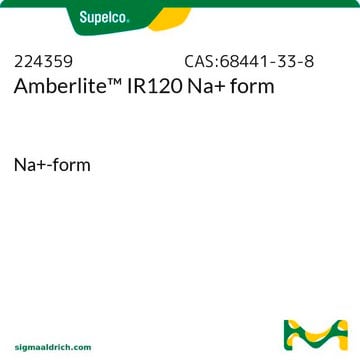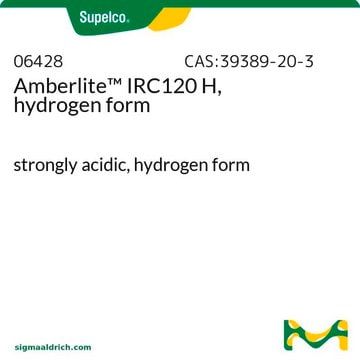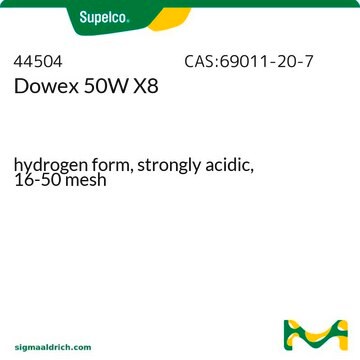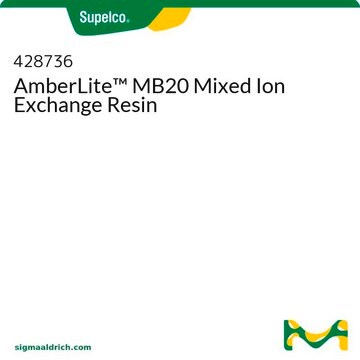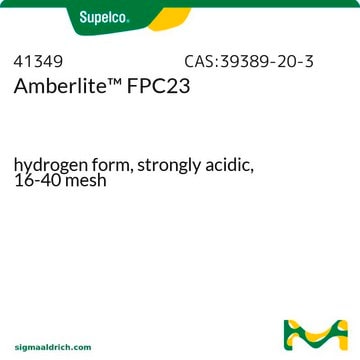91973
AMBERLITE™ HPR1100
Na ion exchange resin, strongly acidic, 20-50 mesh
Synonym(s):
Amberlite™ HPR1100 Na, Amberlite™ HPR1100 sodium
Sign Into View Organizational & Contract Pricing
All Photos(2)
About This Item
Recommended Products
Quality Level
form
beads
manufacturer/tradename
Du Pont Amberlite™
parameter
5-150 °C operating temperature
loss
~45% loss on drying, 110°C
matrix
styrene-divinylbenzene (gel)
matrix active group
sulfonic acid
particle size
20-50 mesh
535-635 μm
operating pH range
0-14
capacity
≥2.0 eq/L total exchange capacity(Na+ form)
42.0-48.0 % water retention capacity(Na+ form)
separation technique
strong cation exchange
General description
AMBERLITE™ HPR1100 Na Ion Exchange Resin is a strongly acidic cation exchange resin for demineralization and industrial softening applications.
Application
AMBERLITE™ HPR1100 is a cation-exchange resin and can be used:
- For grafting polyethylene glycols for catalyzing regioselective azidolysis of epoxides.
- For the immobilization of β-cyclodextrin to be used as a phase transfer catalyst for the reduction of epoxides to alcohols.
- As an adsorbent for the removal of arsenic and copper from aqueous solutions.
Legal Information
Amberlite is a trademark of DuPont de Nemours, Inc.
Signal Word
Warning
Hazard Statements
Precautionary Statements
Hazard Classifications
Eye Irrit. 2
Storage Class Code
11 - Combustible Solids
WGK
WGK 3
Personal Protective Equipment
dust mask type N95 (US), Eyeshields, Gloves
Choose from one of the most recent versions:
Already Own This Product?
Find documentation for the products that you have recently purchased in the Document Library.
Customers Also Viewed
Arsenite and arsenate sorption by hydrous ferric oxide/polymeric material.
Habuda-Stanic M, et al.
Desalination, 229(1-3), 1-9 (2008)
Poly (ethylene glycol) grafted onto dowex resin: an efficient, recyclable, and mild polymer-supported phase transfer catalyst for the regioselective azidolysis of epoxides in water.
Kiasat AR, et al.
The Journal of Organic Chemistry, 73(21), 8382-8385 (2008)
Wei Zhang et al.
Chemosphere, 227, 247-255 (2019-04-17)
Previous studies have demonstrated that anaerobic digestion (AD) enhances sludge dewaterability. However, the mechanism of AD influence on digested sludge dewaterability is still not well understood. In this study, moisture distribution and bond energy were used to evaluate the influence
Removal of copper from aqueous solution by ion exchange resins.
Veli S and Pekey B
Fresenius Environmental Bulletin, 13(3), 244-250 (2004)
Immobilization of ?-cyclodextrin onto Dowex resin as a stationary microvessel and phase transfer catalyst.
Kiasat AR and Sayyahi S
Catalysis Communications, 11(5), 484-486 (2010)
Our team of scientists has experience in all areas of research including Life Science, Material Science, Chemical Synthesis, Chromatography, Analytical and many others.
Contact Technical Service
